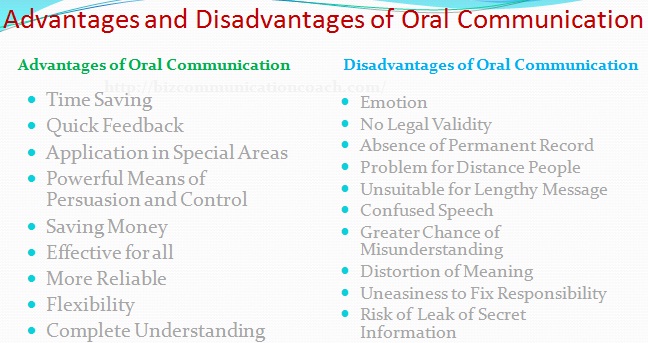Advantages and Disadvantages of Oral Communication in Business Oral communication is one of the most pervasive forms of communication. In the world, most o the people spend most of their time in communicating orally because of its easiness to use. Oral communication has many advantages and some of them are discussed below:
Advantages and Disadvantages of Oral Communication
- Time Saving: Oral communication is used widely when rapid or immediate action is required. When the workload becomes high, the executives just transmit a message over telephone or call a snap conference or just walk down the corridor and give oral instructions to the subordinates. It helps them to expedite work. So, oral communication saves valuable time of executives.
- Quick Feedback: Another important advantage of oral communication is that is produces quick feedback. The receiver and the sender both can adjust the message depending on their conversation and therefore each one gets immediate feedback or reaction from his counterpart.
- Application in Special Areas: Oral communication is more useful in communicating message with groups at assemblies, meetings etc. Senior officers can motivate the subordinates by using face to face oral conversation.
- Powerful Means of Persuasion and Control: Speech oral communication is a powerful means of persuasion and control. For this reason, executives often prefer to transmit messages orally rather than in written form.
- Saving Money: Written communication is cost oriented whereas oral communication saves money. Oral communication does not require any writing instrument that incurs cost. So, in most of the cases it saves money.
- Effective for all: Written communication is appropriate only for literate people but oral communication is suitable for both literate and illiterate people.
- More Reliable: Employees feel more secured when they get written message but they find oral messages more reliable because of having the opportunity of feedback and clarification.
- Flexibility: Oral communication enjoys huge flexibility. Like written communication, it does not require to maintain formalities. So, the content of the message can be changed at any time as required.
- Complete Understanding: In case of oral communication, the receiver can ask any question directly to the sender for better understanding of the message clearly. Since feedback opportunity is there in oral communication, both parties can better understand the message to be exchanged.
The efficacy of oral communication is more pervasive. For the above mentioned advantages, in most of the cases, people prefer oral communication to the other methods of communication. Business Communication

Disadvantages of Oral Communication
No communication is sent present perfect in every case. Like other communication methods oral communication has also some disadvantages as described below:
- Emotion: In written communication there is no scope of using emotion. But in oral communication the speakers may be emotional that make the message complex to understand clearly.
- No Legal Validity: Oral message do not have any legal validity unless they are taped or written and made a permanent record. This is a major drawback of oral communication.
- Absence of Permanent Record: In case of oral communication, message are not kept or preserved and hence no permanent record of the messages is found afterwards.
- Problem for Distance People: Oral communication is not possible if the sender and the receiver of the message are far away from each other and no mechanical devices are available to connect them.
- Unsuitable for Lengthy Message: Oral communication is suitable only for oral transmission of information. It is not suitable for exchanging lengthy messages because of the chance of missing some vital points.
- Confused Speech: Sometimes, due to mannerism or indistinct pronunciation, a party may fail to understand the meaning of a message that creates confusion in the receiver’s mind.
- Greater Chance of Misunderstanding: In oral communication there is a greater chance of misunderstanding both the sender and the receiver may be inattentive while the message is flowing that may lead to misunderstanding of both parties.
- Distortion of Meaning: The meaning of oral message may be distorted easily as they are not filed instantly. And distorted message always creates confusion.
- Uneasiness to Fix Responsibility: In oral communication, if there is any mistake in the messages, responsibility for it cannot be specifically assigned to anybody as there is no record.
- Risk of Leak of Secret Information: In oral communication there is a greater risk of leak of information. At the time of discussion, some secret information may be leaked out due to the lack of carefulness of the parties.
In fine, we can say that oral communication has also some drawbacks but the use of oral communication is still immense because of its inherent nature.

Tqq for ur desired response towards me …im satisfied with the response u had referred….im knew about tge concept too thank you